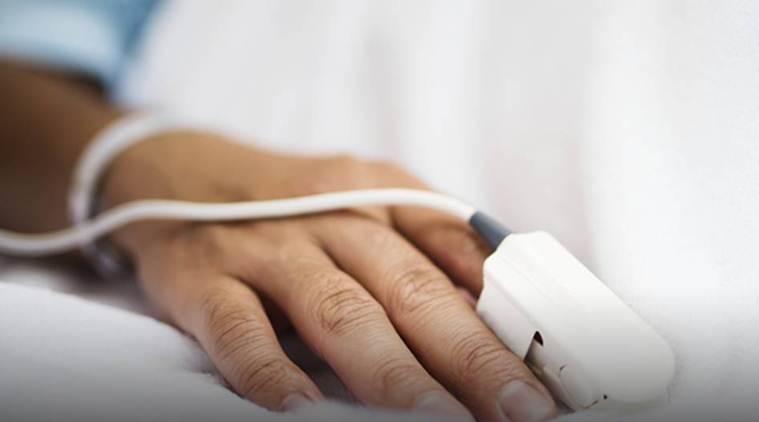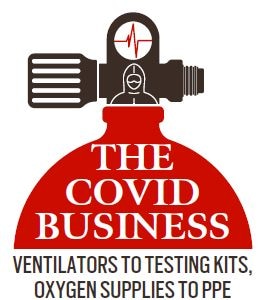
[ad_1]
 The pulse oximeter can be attached to a person’s fingers, toes, nose, feet, ears, or forehead. (Source: Getty Images)
The pulse oximeter can be attached to a person’s fingers, toes, nose, feet, ears, or forehead. (Source: Getty Images)
THE SURGE in Covid cases has boosted demand for pulse oximeters but Indian manufacturers complain that zero customs duty on medical devices to tackle the infection has led to the market being flooded with imports, cutting into their market share.
They have also raised questions about the dependence on China when it comes to components. And highlighted the lack of effective regulation and certification for the device that measures oxygen levels in blood — a key parameter to flag the onset of Covid.
In Delhi, where cases are nearing the 1.1 lakh mark, the government has ordered 65,000 pieces of which 59,000 have been delivered, said Sanjay Goel, in-charge of Covid purchases and MD of Delhi Tourism and Transport Development Corporation.
Read| Imaging boom: Portable X-rays to scanners, AI solutions to track Covid
Tamil Nadu, Principal Secretary (Health) J Radhakrishnan said, “We have arranged nearly 30,000 units. Some local bodies have also bought their own.”
Industry sources said bulk orders have also been placed by Karnataka, Maharashtra, Kerala and Gujarat. The central government, meanwhile, has decided to reimburse the price of pulse oximeters (up to Rs 1,200) purchased by CGHS beneficiaries who test positive.

“Over the past few years, we have been making and selling nearly 70,000 pieces every year, but in the last three months we have sold more than that number. Due to growing demand, we are thinking of manufacturing pulse oximeters, full-fledged, at the component level. But despite the growth in sales, our market share in India has reduced to less than 50 per cent of what it was earlier. That is because cheaper products are available,” said Praveen Nagpal, Senior Vice President, BPL Medical Technologies.
The rise in demand is also at the individual level, said N K Agrawal, a shop owner at South Delhi’s Yusuf Sarai market. “Till February, hardly any customer asked for pulse oximeters. But since June, the average daily sale in this market is more than 100 pieces,” he said.
Read| Govts to homes, Covid case spike lifts demand for oxygen
Jaipur-based Yash Modi, proprietor of Micro and Nano Technologies, imports components from China and manufactures nearly 1 lakh pieces annually under the brand name Meditive. “We are facing over 25 per cent increase in demand,” he said. From April, all medical devices have been classified as drugs, and manufacturers and importers are advised to declare details of the devices within 18 months. Last month, the National Pharmaceutical Pricing Authority directed all manufacturers and importers to detail the quantity and maximum retail price of these devices. “We have gathered details. We are examining the matter,” says N I Choudhury, Advisor, NPPA.
Some of the established brands, such as Novin, Dr Trust and Masimo, are from the US. Many of the models manufactured in India, including BPL, ChoiceMMed, Newnik, Nidek, Medtek, Accusure and Infinity, use components from abroad, mostly from China. Others import “readymade items” from China to be repackaged and sold here, say industry experts.
“The dependence of Indian manufacturers on China is high as components, like the chip, are made only in a few countries like China, Taiwan and Mexico,” said a manufacturer.
Read| As Covid curve rises, surge in ventilators causes glut
Industry sources said these devices were available for about Rs 500 each earlier but are now sold for not less than Rs 1,000. “Quality products are available for Rs 2,000-5,000. Some are costlier. But unknown brands are being sold through online platforms and by non-medical traders,” they said.
Established manufacturers and importers have also pointed to lack of adequate quality checks. They point out that while ISO-13485 is a quality management system for medical devices, the CE mark (European Union) and FDA tag (US) are for safety and efficacy. Very few products in the Indian market have these certifications, they say.
“Until it is regulated, the certification of imported items must be checked,” said Tarun Arora, director of Infinity Mediquip, a Delhi-based manufacturer.
“Pseudo manufacturers import items from countries like China and apply stickers of their own brand and claim as Made in India. The zero customs duty on many Covid medical devices is adding to this flood of import of poor quality items,” said Rajiv Nath, forum coordinator, Indian Medical Device Industry (AIMED).
📣 The Indian Express is now on Telegram. Click here to join our channel (@indianexpress) and stay updated with the latest headlines
For all the latest India News, download Indian Express App.
[ad_2]
Source link